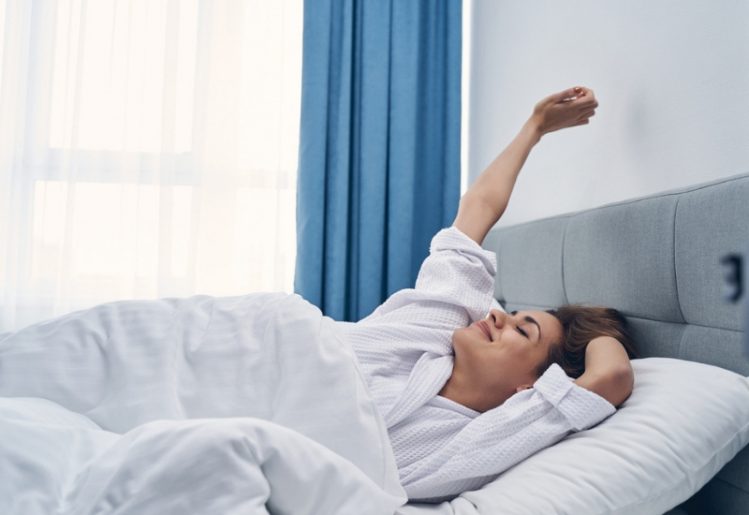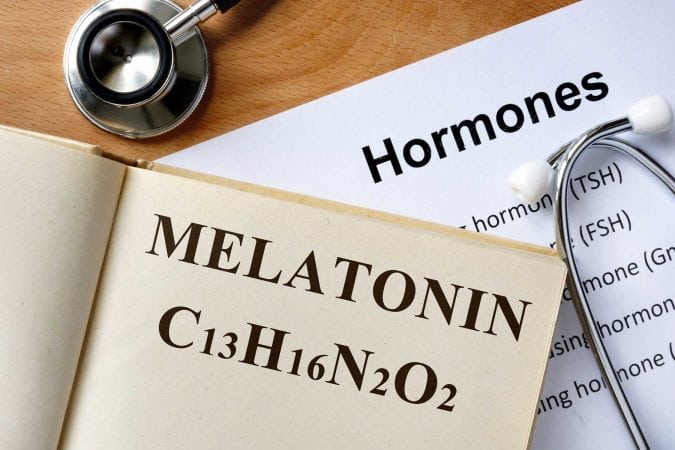Do You Suffer From a Melatonin Deficiency?
It's commonly known that healthy melatonin production is an essential to a restful sleep. As nighttime comes and we prepare for bed, our internal clock, or circadian rhythm, signals the brain that it's time for sleep. In response, the brain releases melatonin, a hormone that's used to regulate sleepiness and wakefulness. If you have trouble sleeping, a melatonin deficiency may be to blame. Learn how to recognize the signs and how to get more of this sleep hormone.
How Does Melatonin Benefit Human Health?
 While setting the stage for slumber is one role of melatonin, it does much more than just help people fall asleep. Even after you fall asleep, melatonin acts as a powerful antioxidant, assisting the body in maintaining health and repairing damage throughout the night.
While setting the stage for slumber is one role of melatonin, it does much more than just help people fall asleep. Even after you fall asleep, melatonin acts as a powerful antioxidant, assisting the body in maintaining health and repairing damage throughout the night.
As melatonin helps regulate sleep, it also influences metabolism by telling the body when it should be active. During sleep, the body enters into a fasting period, so one of the roles melatonin plays is to slow the metabolism and make the body more insulin resistant. This helps store energy for the waking period, when that extra energy will be needed. As the individual awakens and starts their day, the brain stops releasing melatonin and, as a result, the metabolism speeds up and the body becomes hypersensitive to insulin.
As a powerful antioxidant, this sleep hormone also helps to fight free radicals in the body. In this way, sufficient melatonin levels also help protect against unhealthy cell growth throughout the body. It helps guard against heart disease by promoting better cardiovascular health and also strengthens the immune system.
Looking at the way melatonin helps to maintain a healthy immune system, researchers recently found that the hormone may also help protect people from contracting viruses like COVID-19. In addition to being a powerful antioxidant, melatonin possesses potent anti-inflammatory processes, and can help maintain healthy inflammatory processes throughout the body.
In recent studies, melatonin has been found effective in modulating the lung inflammation that results from coronavirus infection. It also has been found to limit the production of proinflammatory cytokines and to keep immune cells in the lungs from becoming infected. Some research suggests the lung tissue damage that COVID-19 causes can also be prevented by the presence of melatonin. While researchers continue to investigate the possibility of using melatonin as a possible COVID-19 treatment, there's already enough evidence to suggest a sufficient supply of melatonin is beneficial to our overall health.
What Causes a Melatonin Deficiency?
Unfortunately, many people experience a melatonin deficiency without realizing that's the source of their health problems. While insomnia and similar sleep disorders are one sign that the brain isn't producing sufficient quantities of melatonin, there are other indications that you may lack a sufficient supply of this hormone.
In addition to having difficulty falling asleep, it may also be difficult to stay asleep. Even if someone with an insufficient supply of melatonin stays asleep throughout the night, they will likely experience a restless sleep. A melatonin deficiency may also cause an individual to awaken too early and find that they can't get back to sleep.
People with insufficient melatonin levels will often experience symptoms in their waking hours as well. They may awaken feeling fatigued or they won't feel as refreshed and energetic as they should. They may experience depressive episodes and suffer cognitive impairments, such as forgetfulness and confusion. Hypertension and increased sensitivity to stress can also be signs of insufficient melatonin levels, which can also expose them to a higher risk for heart disease.
Boosting Melatonin Production Naturally
A doctor can help confirm whether you're suffering from a melatonin deficiency. Once you know your brain isn't producing enough of this hormone, there are some steps you can take to resolve the problem. Here are a few suggestions.
Shut Down One Hour Before Bed
Melatonin production relies on the circadian rhythm to tell the brain when it's night, but the blue light that the screens of electronic devices emits disrupts that process. The light tricks the brain into thinking it's still daylight, so it won't produce melatonin when it should. Research suggests that shutting down devices one hour before going to bed will solve this problem.
Boost Daylight Exposure
 If you spend the majority of your day indoors, you may be inhibiting the way your circadian rhythm functions. By spending some time outside, where you can benefit from direct sunlight exposure, you'll be helping your brain adjust to the 24 -hour cycle. Getting that sunlight earlier in the day will help kick start the production of melatonin earlier in the evening.
If you spend the majority of your day indoors, you may be inhibiting the way your circadian rhythm functions. By spending some time outside, where you can benefit from direct sunlight exposure, you'll be helping your brain adjust to the 24 -hour cycle. Getting that sunlight earlier in the day will help kick start the production of melatonin earlier in the evening.
Take a Melatonin Supplement
You can also add an evening supplement to your routine. For example, Melachron is a supplement that's engineered to help you fall asleep sooner and stay asleep throughout the night. This supplement uses chronobiology to provide a steady supply of melatonin, so you'll be able to sleep throughout the night. The seven-hour supply of melatonin will help you sleep at night without leaving you feeling groggy or fatigued in the morning.
Darken Your Bedroom
Just as getting sunlight in the day will help you fine-tune your biological clock, keeping your bedroom dark will also help. Eliminating light as much as possible will make the melatonin response in your brain that much more powerful, so you'll feel sleepier in your bedroom at night. A darker bedroom will help you relax better, so you'll also have a more restful sleep throughout the night.





